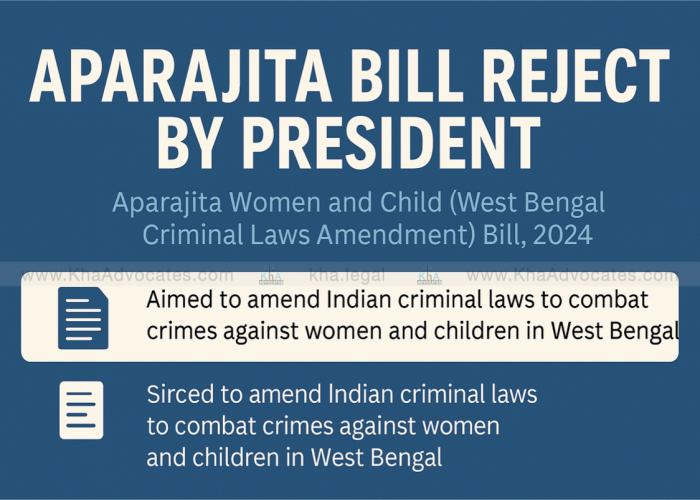
Published on: July 26, 2025
In a significant development, the President of India has rejected the Aparajita Women and Child (West Bengal Criminal Laws Amendment) Bill, 2024, which was passed by the West Bengal Legislative Assembly in February 2024. The bill aimed to introduce stricter state-specific amendments to the Indian Penal Code (IPC), Code of Criminal Procedure (CrPC), and Indian Evidence Act, particularly to combat crimes against women and children.
While the move sparked political debate, it also raises important legal and constitutional questions. In this blog, we explore what the Aparajita Bill proposed, the reasons for its rejection, and its broader legal implications.
The Aparajita Bill, officially titled The West Bengal Criminal Laws (Amendment) Bill, 2024, sought to bring state-level amendments to central criminal laws with the following objectives:
Speedy trial and sentencing in cases involving rape and sexual assault.
Death penalty for gang rape and repeat offenders.
Introduction of time-bound investigation and trial (within 30 days).
Enhanced protection and rehabilitation provisions for victims.
Making the use of electronic evidence more accessible in sexual offences.
The bill was championed by the West Bengal government as a proactive step to protect women and children and reduce the rising crime rates against them.
While the bill was passed by the West Bengal Assembly, it required Presidential assent because it sought to amend central laws like IPC and CrPC—subjects that fall under the Concurrent List of the Constitution.
On July 2024, the President, after legal consultation with the Ministry of Home Affairs and the Union Law Ministry, withheld assent, citing multiple constitutional and procedural concerns:
The bill proposed amendments to criminal laws that were recently overhauled by the Union Government through the Bharatiya Nyaya Sanhita (BNS), Bharatiya Nagarik Suraksha Sanhita (BNSS), and Bharatiya Sakshya Adhiniyam, replacing IPC, CrPC, and the Indian Evidence Act. State-level amendments now risk contradicting the new central framework.
Under Article 254 of the Constitution, any state law that contradicts a central law requires Presidential assent to prevail in that state. However, legal experts pointed out that the Aparajita Bill overlapped excessively with central legislative powers, particularly on matters of criminal procedure and evidence.
The President also considered the long-standing legal principle that criminal law must remain uniform across the country to ensure consistency in justice delivery. Allowing a state to impose different penalties or procedures could lead to disparities and constitutional challenges.
The rejection triggered sharp reactions from both the state government and opposition parties:
West Bengal Government accused the Centre of undermining federalism and playing politics over women’s safety.
Legal experts and opposition parties argued that a well-intentioned bill still needs to adhere to constitutional boundaries.
Civil society and activists were divided—while many praised the intent of the bill, they also questioned the feasibility of certain provisions like the death penalty and fast-tracked trials without due process.
The controversy around the Aparajita Bill offers valuable insights into how laws are made, challenged, and interpreted in a federal system:
Laws on Concurrent List Need Delicate Handling
States can legislate on concurrent matters like criminal law, but any amendment must not be repugnant to central laws without prior assent.
Federal Structure and Checks & Balances
The rejection underscores the role of the President as a constitutional check when state legislation could disrupt national legal uniformity.
Need for Collaborative Lawmaking
Instead of unilateral state amendments, there’s a growing demand for cooperative federalism where states and the Centre work together to address regional concerns.
While the Aparajita Bill has been rejected, the legal needs of victims of gender-based crimes remain urgent. With the introduction of Bharatiya Nyaya Sanhita (BNS) and other criminal law reforms in 2024, the focus must now shift to:
Implementation of new central laws
Effective legal representation for victims
Training of police and judiciary
Access to fast-track courts
Robust evidence handling and victim protection
The Aparajita Bill’s rejection by the President is not just a political headline—it is a legal milestone. It reminds us of the delicate balance between state autonomy and national legal consistency. As India navigates new criminal laws under the BNS framework, proactive legal advice and robust advocacy will remain crucial.

